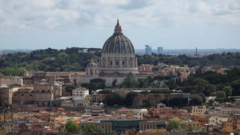The upcoming funeral of Pope Francis is set to draw a multitude of world leaders, combining tributes with rare diplomatic opportunities. While formal meetings are considered inappropriate given the occasion's somber nature, officials anticipate spontaneous encounters between leaders that could spark crucial discussions. With significant figures like Presidents Trump and Zelensky attending, the potential for dialogue—especially regarding the ongoing conflict in Ukraine—looms large, despite planned seating arrangements that may separate them.
Pope Francis's Funeral: A Stage for Unexpected Diplomacy

Pope Francis's Funeral: A Stage for Unexpected Diplomacy
World leaders convene for the Pope’s funeral, marking a rare chance for delicate diplomatic interactions amidst solemnity.
The stage is set for something extraordinary as world leaders gather at the Vatican for Pope Francis's funeral. This ceremony, expected to be one of the most significant diplomatic assemblies in recent history, may offer a backdrop for crucial conversations that go beyond memorializing the late Pope.
Given that formal meetings are avoided to respect the occasion, the event transforms into fertile ground for informal "brush-by" diplomacy—quick exchanges and impromptu gatherings among heads of state. European diplomats express the sentiment that, while dignity is paramount, the opportunity for leaders to connect casually exists and could yield fruitful discussions on pressing issues.
Amid this environment, all eyes will be particularly trained on the seating arrangement for Presidents Trump and Zelensky, with many speculating whether they will engage in discussions regarding a ceasefire in Ukraine. Their placement in St. Peter's Square—determined alphabetically—will likely see them at a considerable distance from one another, potentially averting direct confrontation but raising questions about any possibility of a private meeting later.
Zelensky has recently indicated a willingness to engage with Trump, stating his openness to talks, while Trump mentioned having numerous meetings lined up, albeit without specifics. As the geopolitical landscape evolves, these leaders’ paths may converge or diverge during the poignant yet politically charged atmosphere of the funeral.
With around 170 delegations including numerous heads of state in attendance, the potential for diplomatic exchanges extends beyond the funeral itself. Encounters at the airport and other venues in Rome may provide additional informal settings for dialogue amid the shared loss of the Pope.
However, the gathering is not devoid of risks, particularly in interactions with adversaries, and the absence of leaders like Vladimir Putin and Xi Jinping echoes broader geopolitical rifts. There exists a precarious balance between respectful observance of the occasion and the pressing need for global leaders to address ongoing crises collaboratively.
As the funeral unfolds, even the ritualistic gestures—such as the moment of peace during the Mass—could turn into unforeseen diplomatic exchanges. Historical precedents reveal how past funerals have positioned leaders into unexpected interactions, often accompanied by public reactions that reflect their nations' sentiments.
From a diplomatic perspective, the funeral of Pope Francis, like other "working funerals," serves a dual purpose: to honor a beloved figure while simultaneously affording leaders an informal yet significant platform for dialogue. As history has shown, such gatherings hold the potential for meaningful discussions, perhaps redefining relationships and paving the way for future negotiations.
In essence, this funeral stands to be not just a farewell but also a catalyst for diplomatic dialogue, holding standards of solemnity and potential engagement in equal measure.
Given that formal meetings are avoided to respect the occasion, the event transforms into fertile ground for informal "brush-by" diplomacy—quick exchanges and impromptu gatherings among heads of state. European diplomats express the sentiment that, while dignity is paramount, the opportunity for leaders to connect casually exists and could yield fruitful discussions on pressing issues.
Amid this environment, all eyes will be particularly trained on the seating arrangement for Presidents Trump and Zelensky, with many speculating whether they will engage in discussions regarding a ceasefire in Ukraine. Their placement in St. Peter's Square—determined alphabetically—will likely see them at a considerable distance from one another, potentially averting direct confrontation but raising questions about any possibility of a private meeting later.
Zelensky has recently indicated a willingness to engage with Trump, stating his openness to talks, while Trump mentioned having numerous meetings lined up, albeit without specifics. As the geopolitical landscape evolves, these leaders’ paths may converge or diverge during the poignant yet politically charged atmosphere of the funeral.
With around 170 delegations including numerous heads of state in attendance, the potential for diplomatic exchanges extends beyond the funeral itself. Encounters at the airport and other venues in Rome may provide additional informal settings for dialogue amid the shared loss of the Pope.
However, the gathering is not devoid of risks, particularly in interactions with adversaries, and the absence of leaders like Vladimir Putin and Xi Jinping echoes broader geopolitical rifts. There exists a precarious balance between respectful observance of the occasion and the pressing need for global leaders to address ongoing crises collaboratively.
As the funeral unfolds, even the ritualistic gestures—such as the moment of peace during the Mass—could turn into unforeseen diplomatic exchanges. Historical precedents reveal how past funerals have positioned leaders into unexpected interactions, often accompanied by public reactions that reflect their nations' sentiments.
From a diplomatic perspective, the funeral of Pope Francis, like other "working funerals," serves a dual purpose: to honor a beloved figure while simultaneously affording leaders an informal yet significant platform for dialogue. As history has shown, such gatherings hold the potential for meaningful discussions, perhaps redefining relationships and paving the way for future negotiations.
In essence, this funeral stands to be not just a farewell but also a catalyst for diplomatic dialogue, holding standards of solemnity and potential engagement in equal measure.






















